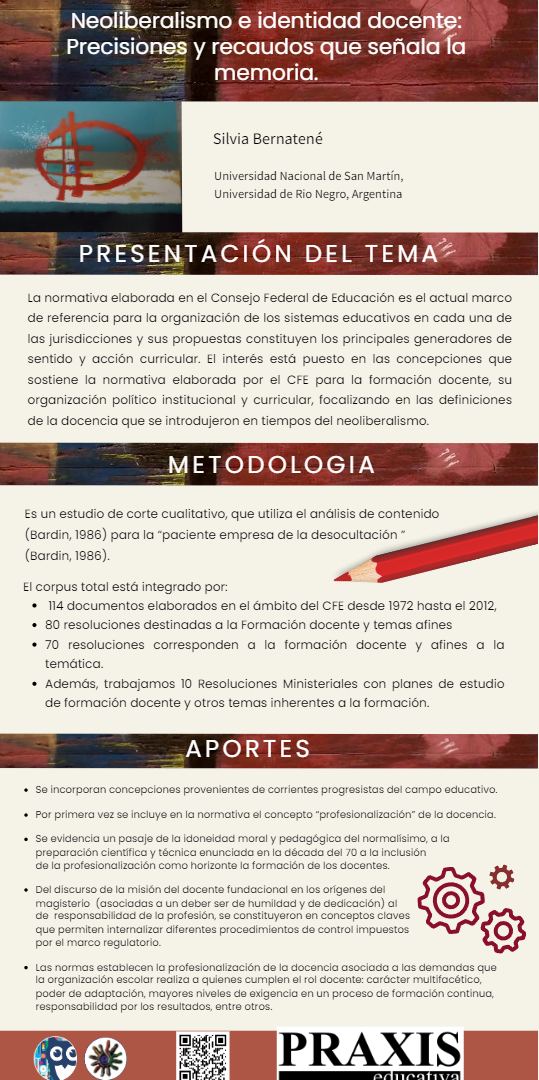Neoliberalismo e identidad docente: precisiones y recaudos que señala la memoria
DOI:
https://doi.org/10.19137/praxiseducativa-2023-270304Palabras clave:
Consejo Federal de Educación – actuación normativa - formación docente - neoliberalismo- identidad docenteResumen
Este artículo presenta parte de los resultados de una investigación más ampliai en la que se analizan las concepciones que sostiene la normativa elaborada por el Consejo Federal de Educación (CFE) para la formación docente en Argentina. El artículo contiene las principales características de los cambios conceptuales de la normativa para la formación docente referidas a la identidad docente durante la implementación de políticas neoliberales de la década del 90. Es un estudio de corte cualitativo, que utiliza el análisis de contenido como uno de los métodos predominantes para profundizar el conocimiento de la vida social.
[1] Investigación doctoral “El Consejo Federal de Educación y la formación docente: una lectura de su actuación en clave didáctica” Director Juan Carlos Geneyro. UNLA/UNTREF/UNSAM. Tesis aprobada y defendida el 21/7/2020.
Descargas
Citas
Abal Medina, J.M. y Barroetaveña, M. (1997) El Estado. En J. Pinto (Ed.) Introducción a la ciencia política. (pp. 63-151). Eudeba. Bardin, L. (1986). Análisis de contenido. Ediciones Akal.
Berger, P. y Luckman, T. (2006) La construcción social de la realidad. Amorrortu Editores, 1º Ed.
Birgin, A. (1999). Trabajo de Ensenar. Troquel
Carnoy, M. (2005). La búsqueda de la igualdad a través de políticas educativas: alcances y límites. REICE, Revista Iberoamericana sobre calidad, eficacia y cambio en educación, 3 (2), pp. 1-14
Davini, M. C. (1995). La formación docente en cuestión. Paidós.
Diker, G., & Terigi, F. (2003). Formación de maestros y profesores: Hoja de ruta. Paidós.
Dubet, F. (2006). El declive de la institución: profesiones, sujetos e individuos ante la reforma del Estado. Gedisa
Feldfeber, M. (1998). Las políticas de formación docente en los 90. Revista Versiones (9), pp. 15-19.
Foucault, M. (1996). La verdad y las formas jurídicas. Gedisa
Gentili, P., Suárez, D., Stubrin, F., y Gindín, J. (2004). Reforma educativa y luchas docentes en América Latina. Educação & Sociedade, 25(89), pp. 1251-1274.
Goodson, I. F. (1995). Historia del currículum: la construcción social de las disciplinas escolares. Pomares-Corredor. (2008). Ginsburg, M. B., Meyenn, R., Khanna, I., Miller, H. D. R. y Spaig, L. El concepto de profesionalismo en el profesorado: comparación de contextos entre Inglaterra y Estado Unidos. Revista de educación, (285), 5-31.
Lang, V. (2006). La construcción social de las identidades profesionales de los docentes en Francia: enfoques históricos y sociológicos. En Tenti Fanfani, E (comp.). El oficio de docente: vocación, trabajo y profesión en el siglo XXI (pp. 71-119). Siglo XXI.
Míguez, D. (2014). Las reformas educativas argentinas en el contexto latinoamericano. Los sentidos de igualdad y democracia (1983-2006). Revista Latinoamericana de Estudios Educativos (México), 44(3), 11-42
Olmos, L. (2008). Educación y política en contexto. 25 años de reformas educacionales en Argentina. Revista iberoamericana de educación. 48,167-185
Oszlak, O. y O Donnell, O. (1984). Estado y políticas estatales en América latina: hacia una estrategia de investigación. Documentos del CEDES, (4)
Paviglianiti, N. y Echenique, M. (1993). Ley Federal de Educación. Buenos Aires, Argentina: Publicaciones FUBA.
Popkewitz, T. (1994). Profesionalización en la enseñanza y la formación del profesorado: algunas notas sobre su historia, ideología y potencial. Docencia y formación docente, 10 (1), 1-14
Tedesco, J. C. (1986). Educación y sociedad en la Argentina (1880-1945). Ediciones Solar.
Tenorth, E. (1988). Profesiones y profesionalización. Un marco de referencia para el análisis histórico del enseñante y sus organizaciones. Revista de Educación. (285), 77-92
Tenti Fanfani, E. (2007). Consideraciones sociológicas sobre profesionalización docente. Educação & Sociedade, 28(99), 335-353.
Tenti Fanfani, E. (2010). El oficio de docente: vocación, trabajo y profesión en el siglo XXI. Siglo XXI
Leyes y decretos
Gobierno de la República Argentina (1972) Ley Nº 19682 Ley de creación del Consejo Federal de Educación.
Gobierno de la República Argentina (1991) Ley Nº 19039 Ley de creación del Plan Nacional de Desarrollo y Seguridad 1971-1975.
Gobierno de la República Argentina (1993) Ley Nº 24195 Ley Federal de Educación.
Gobierno de la República Argentina (2006) Ley Nº 26206 Ley de Educación Nacional.

Descargas
Publicado
Número
Sección
Licencia
Nota de copyright
Comité Editorial Revista Praxis educativa:
Por la presente declaro que soy autor del artículo titulado (nombre del artículo), que el mismo es original y propio y que no fue publicado en ningún otro formato o soporte con anterioridad. Manifiesto conocer que la revista no me cobrará ningún tipo de tasa bajo ningún concepto, ni recibiré ningún tipo de compensación monetaria
Si el mismo fuera aceptado para su publicación en Praxis educativa, autorizo a la referida revista a publicarlo en forma digital y a publicitarlo en sus redes sociales.
Si el trabajo fuera publicado, adhiero a la licencia Creative Commons denominada “Atribución - No Comercial Compartir igual CC BY-NC-SA”, mediante la cual se permite copiar, reproducir, distribuir, comunicar públicamente la obra y generar obras derivadas, siempre y cuando se cite y reconozca al autor original. Esta licencia se utiliza desde septiembre 2018. En 2016 se adhirió a CC BY NC ND 4.0; y en años 2017 y 2018 (enero -agosto) CC BY NC 4.0..
Esta licencia CC BY-NC-SA Compartir igual no permite, sin embargo, utilizar la obra con fines comerciales. Como autor la revista podré establecer acuerdos adicionales para la distribución no exclusiva de la versión de la obra publicada en la revista me permite el autoarchivo de los artículos publicados, en su versión post-print, en repositorios institucionales, temáticos, páginas web personales o cualquier otro uso pertinente. con el reconocimiento de haber sido publicado primero en esta revista.
Praxis educativa adhiere a DORA (Declaration on Research Assessment) firmada en San Francisco, California, el 16 de diciembre de 2012, y a la Declaración de México (Declaración Conjunta LATINDEX - REDALYC - CLACSO - IBICT).














_(1)2.png)


3.png)










_(2).png)






2.jpg)
8.png)









